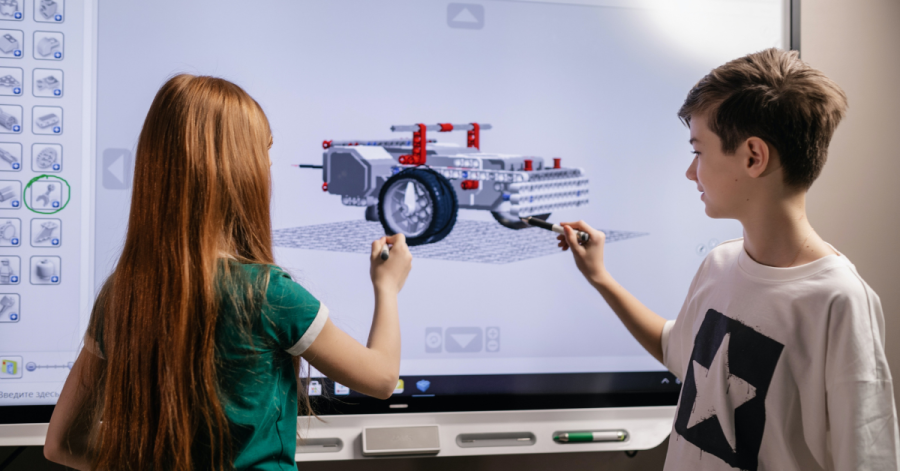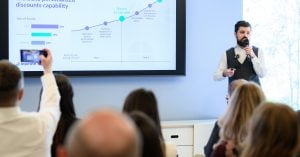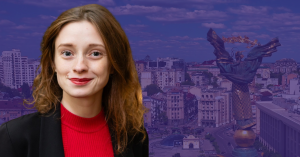Remember the catchy theme song from “Phineas and Ferb” (the popular Disney animated series that follows the adventures of two stepbrothers who embark on exciting and imaginative projects during their summer vacation)? It goes: “There’s 104 days of summer vacation…” and we, at The Recursive, like to continue it with our own lyrics: “…and the quest for tech exploration is on!”.
In the rapidly digitalizing world of the 21st century, technical skills are no longer just optional – they’ve become vital. More than ever before, early immersion in tech-related learning experiences plays a significant role in preparing the younger generation for future careers and the demands of the digital age. However, not just any exposure will suffice; quality, engaging experiences are critical for fostering a love of tech and driving true learning. This is where summer tech camps for kids and teens come in, especially in the context of Central and Eastern Europe (CEE).
There are a good number of summer tech camps across the CEE region that give young minds a chance to embark on their own innovation journeys.
In this article, we unveil a list of summer tech camps across Bulgaria, the Czech Republic, Estonia, Hungary, Latvia, Poland, and Bosnia and Herzegovina that provide a unique blend of learning and fun, allowing participants to develop valuable skills while fostering their creativity. If we have missed a tech camp that should be on the list, feel free to reach out at [email protected].
We’ve also included courses and summer tech initiatives aimed at older students and adults so that everyone can have a summer full of tech fun and innovation.
Please note that availability and specific details for these tech camps may vary from year to year, so it’s recommended to visit their respective websites for up-to-date information regarding schedules, locations, and registration.
Bulgaria
Telerik School Academy
Telerik School Academy is a renowned national educational program established by the Telerik Academy Foundation. It aims to equip students from 1st to 12th grade with the skills required for the digital future.
Since its inception in 2010, over 20,000 students have benefitted from the Academy’s comprehensive in-person training. Telerik School Academy occasionally does summer tech camp initiatives so it’s worth keeping an eye on their programs.
SoftUni
SoftUni offers comprehensive professional software and QA engineering programs in Bulgaria, equipping students with the skills needed to pursue careers as software engineers or software automated testing engineers.
The curricula for software and QA engineering at SoftUni have been meticulously developed in collaboration with industry-leading IT companies.
Beyond the professional programs in software and QA engineering, SoftUni also provides a wide range of courses covering diverse topics such as system administration, artificial intelligence, cybersecurity, robotics, and more. SoftUni organizes summer activities (including summer tech camps) for kids and teens from time to time so keep an eye on their programs and courses.
IT STEP Computer Academy
Catering to both adults and children, IT STEP Computer Academy specializes in delivering IT education. The academy is popular in a few CEE countries, including Bulgaria, Romania, and Ukraine.
They have a Summer Computer IT Camp that can be attended both in-person and online. The age group is 10-55 years old. The camp’s program features classes in various subjects such as 3D modeling, VR, and game design.
American University in Bulgaria’s Educational Summer Camp
The annual Educational Summer Camp organized by AUBG caters to high school students between the ages of 14 and 17. This specially curated camp offers an opportunity for students to enrich their summer vacation by engaging in a diverse range of activities, fostering new friendships, and enjoying a fun-filled learning experience alongside peers from both Bulgaria and other countries.
There’s a Business & Entrepreneurship course that can be very beneficial for tech-inclined students who want to learn how to generate innovative ideas, do market research, and raise capital.
INSAIT Undergraduate Summer Research Fellowship
The Undergraduate Summer Research Fellowship program at INSAIT offers undergraduate students worldwide the chance to engage in research activities during the summer. Modeled after successful programs at MIT, Caltech, and ETH Zurich, this program provides students with mentorship from esteemed faculty and researchers.
The program runs for 8-10 weeks, and the specific project duration is determined by the student and mentor. Students are required to be physically present at INSAIT in Sofia, Bulgaria for a minimum of 8 (maximum 10) weeks.
Undergraduate students in any accredited university can apply, with preference given to those in STEM majors like computer science or math. Applicants should have a minimum GPA of 3.5 (out of 4.0) or its equivalent, and individuals from underrepresented communities in STEM are strongly encouraged to apply.
Bulgarian Academy of Sciences’ Summer Research School in Mathematics and Informatics
SRS (Summer Research School) is a prestigious program tailored for high-achieving teenagers passionate about mathematics, informatics, and ICT. Combining the best practices of renowned programs like RSI (organized by CEE and MIT), SRS offers a unique and dynamic small-scale learning environment.
HSSIMI (High School Students Institute of Mathematics and Informatics) identifies and nurtures students with a research inclination in mathematics and informatics. Eligible applicants are high school students aged 15 to 19 who are yet to complete their secondary education.
At SRS, students collaborate with scientific mentors from the Bulgarian Academy of Sciences and international research universities. Each participant focuses on a personal research topic, exploring fields such as Combinatorics, Number Theory, Algebra, Computing, Genetic Algorithms, and Modeling.
The program encompasses lectures on advanced scientific problems, modern technologies, and engages participants with industry representatives and academic institutions. Additionally, it offers soft skills training and discussions on essential topics like ethics in science, responsible research, and innovation.
MindHub
MindHub is a network of coding academies designed for children and teenagers aged 6 to 18. Their courses focus on cultivating logical and analytical thinking skills through the study of programming fundamentals.
They have a Summer Academy with a program that includes 20 independent thematic days focused on game programming, interactive storytelling, and robot behavior programming.
Summer School on Space Research, Technology and Applications
This event has had two editions until now and it is catered towards young scientists and PhD students. The event offers a comprehensive exploration of various topics, spanning theoretical astrophysics, engineering, and computing.
The program features a blend of lectures and practical training sessions curated over the course of one week. Each participant collaborates with an experienced mentor to develop and present their practice-based outcomes. Furthermore, during a dedicated PhD session, participants are encouraged to provide a concise overview of their PhD research topic.
Keep an eye on their website for updates on upcoming summer tech camps events.
University for Children’s SUMMER Academies
The University for Children aims to ignite the spark of curiosity in children while having fun, experimenting and developing their research skills.
They do summer academies focused on various subjects such as creative mathematics, competitive robotics, adventure robotics, and engineering robotics and mechatronics.
Academy Robotics’ Summer School
This summer school is for children aged 4 to 6 and 7 to 12. The program is designed in collaboration with “Smetalo Academy” and offers activities with LEGO robots and engaging mathematics.
Czech Republic
IEEE RAS Summer School on Multi-Robot Systems
With a focus on Multi-Robot Systems, the program of IEEE RAS Summer School on Multi-Robot Systems aims to showcase the latest advancements in research and foster practical implementation of cooperative robot systems.
Attendees, including students, academic researchers, and industry professionals, can attend lectures by renowned experts in the field, as well as get hands-on experience with innovative aerial platforms developed for Multi-Robot research.
Estonia
Tallinn Summer School
The Tallinn Summer School has been around since 2006. This is a 3-week program held in July that offers a diverse range of courses, including ones in design and engineering like crafting tactile wearables and design of digital services for health behavior change.
TalTech’s Summer School
Tallinn University of Technology (TalTech) has summer school programs that include courses such as Practical Robotics with 3D Printing, designed for both undergraduate and graduate students with a background in mechanical engineering, mechatronics, information technology, or those with a keen interest in robotics and programming. It provides a hands-on learning experience that encompasses practical applications of robotics and 3D printing.
Hungary
ELTE Budapest Summer University
ELTE, the premier higher education institution in Hungary, organizes the ELTE Budapest Summer University. This program offers one-week and two-week in-person courses conducted entirely in English, welcoming applicants from both Hungary and abroad. There’s a diverse range of study fields, including Introduction to tools and methods of Artificial Intelligence and Geoinformatics.
Latvia
Latvia-Cambridge Venture Camp
This camp consists of two parts, with the first part taking place in Latvia, both in-person and online. During this phase, participants collaborate in teams to develop their business ideas and compete for the opportunity to advance to the second part of the camp in Cambridge, United Kingdom.
The camp is led by esteemed faculty members and entrepreneurs. Applicants can include students, nascent entrepreneurs, and innovators with technological business ideas, either individually or as part of a team.
Poland
PwC’ Tech Summer Camp
Tech Summer Camp offers a dynamic summer internship program in the field of IT. This paid program provides individuals with a keen interest in technology the opportunity to further develop their skills.
The program offers three distinct areas of focus: Salesforce, Microsoft, and Quality Assurance. Throughout the internship, participants have the opportunity to gain hands-on experience by taking part in the complete software development cycle.
Bosnia and Herzegovina
STEM Youth Camp
The Association for the Advancement of Science and Technology (AAST) has organized three installments of the STEM Youth Camp (SYC).
AAST brings together a community of accomplished young scientists and experts in natural, mathematical, and technical sciences, particularly in the STEM field.
With members working in renowned scientific institutions and universities globally, as well as within Bosnia and Herzegovina, AAST aims to bridge the gap between scientific research and young individuals, specifically high school students. The organization helps these students explore and confirm their interests and talents in STEM fields.
Usually, around 48 high school students immerse themselves in the roles of scientists and engineers for five days, delving into modern scientific and technical trends.
Bonus Summer Camps
ISSC (International Science Summer Camp)
The International Science Summer Camp (ISSC) gathers approximately 60 young individuals (aged between 18 and 25 years old) for a week-long immersive experience in exploring and learning about science within a specific topic. This program not only fosters scientific knowledge but also facilitates cross-cultural exchange, enabling participants to discover diverse cultures and ideas while applying theoretical concepts to practical experiments.
MILSET collaborates with national organizers each year to host ISSC in a new country (CEE countries included), expanding the program’s reach and providing fresh opportunities for young scientists.
Space Camp Turkey
Space Camp Turkey stands as one of only two centers of its kind worldwide, and the only such facility located in Europe, Asia, and the Middle East.
The programs have a focus on cultural exchange and immersive hands-on space science experiences and they are a good fit for English-speaking children aged 9-15.
Space Camp Turkey’s exclusive international summer camps have been around for over two decades with a diverse group of participants from Bulgaria, Poland, Romania, Lithuania, and beyond attending every year.








